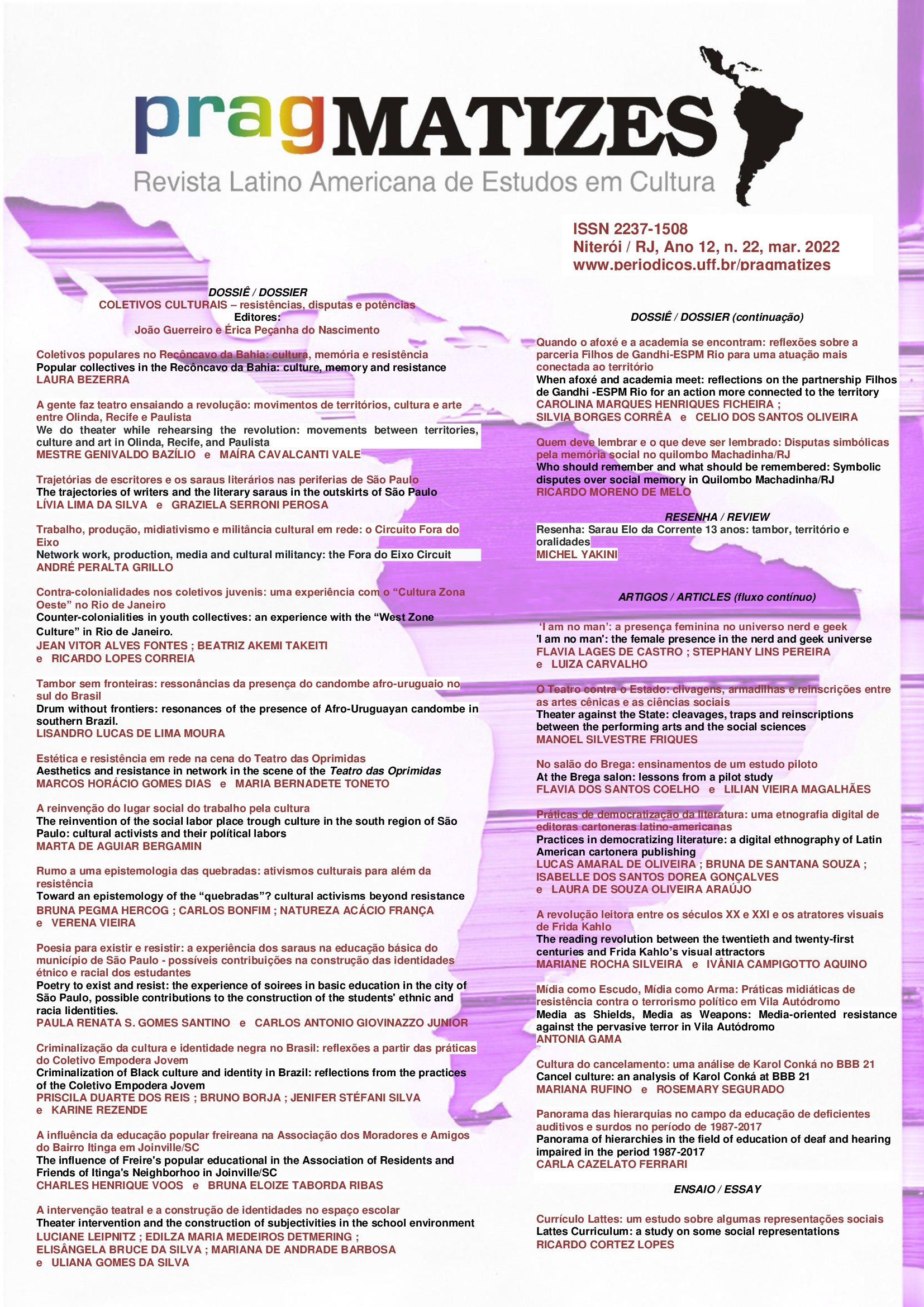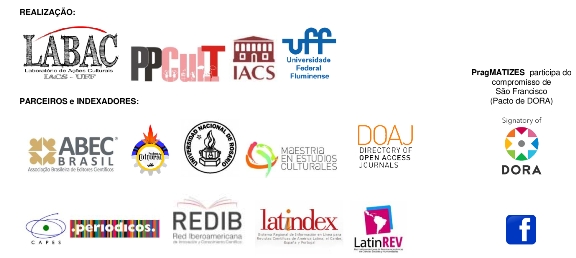We do theater while rehearsing the revolution
movements between territories, culture and art in Olinda, Recife, and Paulista
DOI:
https://doi.org/10.22409/pragmatizes.v12i22.51414Keywords:
street theater, cultural moviments, resistance, popular struggleAbstract
This article is an experimentation in writing based on the narratives of Genivaldo Bazílio, master of popular culture in Pernambuco, on his involvement with street theater and the founding of the Grupo de Teatro Atual (GTA) together with a group of people in the periferias of Recife, Olinda and Paulista, communities marked by racial and social inequalities. The aim is to turn speech into text as part of a joint writing process - both in the passage of audio to written form and in the marking of pauses and selection of sections. In doing so we hope that the act of remembrance becomes itself a theoretical reflection on a collective trajectory that traverses neighborhoods and encounters movements of popular culture, such as Pernambuco’s Movement of Popular Theater, the Unified Black Movement, the struggle to turn the Nascedouro of Peixinhos into a cultural space, the Landless Movement, Paulo Freire’s pedagogy of the oppressed, Abdias do Nascimento’s Black Experimental Theater, Augusto Boal's Oppressed Theater, the National Coordination of Black Entities and the union movement. Such reflection about GTA’s trajectory is not presented by means of a theoretical discussion and explanatory synthesis of a historically situated cultural movement, but rather by showing how authors, movements and theoretical discussions worked their way through GTA and influenced their practice as a black popular street theater.
Downloads
References
BOAL, Augusto. Teatro do oprimido e outras poéticas políticas. 6ª edição, Rio de Janeiro: Editora Civilização Brasileira S.A., 1991.
FREIRE, Paulo. Pedagogia do oprimido. São Paulo: Paz e Terra, 1974.
GONZALEZ, Lélia: Racismo e Sexismo na Cultura Brasileira. Revista Ciências Sociais Hoje, Anpocs, p. 223-244,1984.
NASCIMENTO, Abdias. Sortilégio. In: Dramas para negros e prólogo para brancos. Antologia de Teatro Negro-brasileiro. Rio de Janeiro: TEM – Teatro Experimental do Negro, 1961. p. 161-197.
PINHEIRO, Inaldete. A Calunga e o Maracatu. Recife, 2007.
PINHEIRO, Inaldete. Baobás de Ipojuca. Recife: Bagaço, 2008.
PINHEIRO, Inaldete. Cinco Cantigas para você contar. Olinda: Produção Alternativa, 1989a.
PINHEIRO, Inaldete. Coleção Velhas Histórias, Novas Leituras. Recife: Edição da autora, 2010.
PINHEIRO, Inaldete. Pai Adão era Nagô. Olinda: Produção Alternativa, 1989b.
PINHEIRO, Inaldete. Racismo e Anti-Racismo na Literatura Infanto-Juvenil. Recife: Etnia Produção Editorial, 2001.
PINHEIRO, Inaldete. Uma aventura do Velho Baobá. Revista Palmares, Brasília, v. 8, n. 1, p.78-81, nov. 2014.
TRINDADE, Solano. Cantares ao meu povo. São Paulo: Fulgor, 1961.
TRINDADE, Solano. Poemas Antológicos de Solano Trindade. Seleção e introdução de Zenir Campos Reis. São Paulo: Editora Nova Alexandria, 2008.
TRINDADE, Solano. Seis tempos de poesia. São Paulo: H. Melo, 1958.
TRINDADE, Solano. Tem gente com fome e outros poemas. Rio de Janeiro: Departamento Geral da Imprensa Oficial, 1988.
Published
Versions
- 2022-03-03 (2)
- 2022-03-02 (1)
How to Cite
Issue
Section
License

This work is licensed under a Creative Commons Attribution 4.0 International License.
By forwarding an original to PragMATIZES, the authors agree that the copyright related to it is transferred to the Publishing. Articles and other writings are made available in PDF format from their publication, and they can be downloaded to institutional repositories and personal pages, provided that with their proper bibliographic indication.



